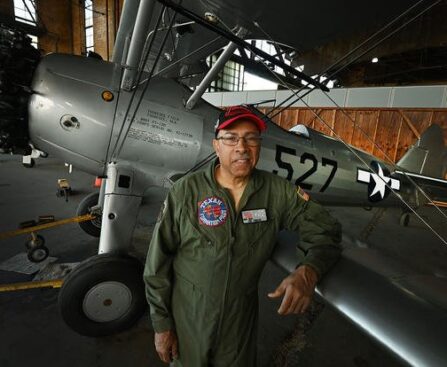In 1969, Rothacker Smith sat down with his 12-year-old son, Brian, in their Huntsville, Alabama, home to share his experiences as an Army medic during World War II.Rothacker was stationed in Italy and told of being captured by Nazis and forced to march through a town to a prisoner of war camp. As he marched, some captured White soldiers told Rothacker the Nazis would likely shoot him dead because of his skin color. Rothacker was Black.”Did they shoot you?” Brian Smith recalls asking his father. His father’s reply, according to his son: “Calm down, boy. I’m here telling you this story, aren’t I?”Just as memorable to Smith was his father’s stories of serving alongside members of the U.S. Air Force 332nd Fighter Group and the 447th Bombardment Group. They were the first African American pilots and airmen in the U.S. military. They flew more than 15,000 individual sorties in Europe and North Africa. They earned more than 150 Distinguished Flying Crosses and helped encourage the eventual integration of the U.S. armed forces.Smith considers his father his “hero,” along with those legendary Black pilots and airmen. That’s why Smith has devoted a good portion of his adult life to preserving the legacy of those pioneer pilots, who are now commonly known as the Tuskegee Airmen.And in the spirit of them succeeding against racial and class barriers, Smith, who lives in Detroit, has also enabled scores of young people, many from Detroit, to take aviation courses and learn how to fly.For more than 35 years, Smith has been involved in some way with the Tuskegee Airmen. He is the president and CEO of the Tuskegee Airmen National Historical Museum. Thanks to his help, the museum has multiple sites in Detroit, including exhibits at Historic Fort Wayne and the Charles H. Wright Museum of African American History in Detroit.Inside Hangers 13 and 14 at the Coleman A. Young International Airport, the third Tuskegee Airmen museum site, are several restored WWII planes flown by Tuskegee pilots. The airport is also home to a training academy where high school students and young adults have taken aviation courses for years.”We either get you a lot of flight experience … to the point of solo, or we get you a private license before you go to college. And that saves a student $20,000 and $30,000,” Smith said. That’s because he’s helped the Tuskegee group raise funds for the training.Talmage Turner is among those planning a career in aviation thanks to the Tuskegee training academy. Turner met Smith in high school at a local air show. Smith was there touting the legacy of the Tuskegee airmen. Turner soon became a student in the academy.”He was more than a teacher to us. He was a mentor,” Turner said. “He was always just encouraging, and he made it seem possible that this goal of being in aviation was something we could actually achieve. That was so helpful to understand that it was attainable,” Turner said.In May, Turner, 22, graduated from Elizabeth State University in North Carolina with a Bachelor of Science in Aeronautics, Aviation and Aerospace Science and Technology. He plans to become a commercial pilot.Smith’s accomplishments extend beyond his work with the Tuskegee group. He was the first African American to earn a biomedical engineering doctorate from Wayne State University. His career at General Dynamics Land Systems included pioneering research in injury tolerance limits from battlefield threats like mine blasts and improvised explosive devices.He has been deeply engaged in civic and community service in Detroit. For 35 years, he led the Conant Gardens Cougars Pathfinder Club, mentoring youth and creating opportunities for leadership development. As part of that, he founded and directed a youth drum corps that performed statewide.Bill Oddo has known Smith for about 25 years. Oddo is a fellow aviator and met Smith at the Detroit city airport.”He speaks really softly but carries a big stick. I’ve seen him speak up whenever he feels he can advance the cause of getting more opportunities in aviation for people from all walks of life. He’s a man of real character,” Oddo said.Smith credits his faith for his ability to achieve so much. He’s been a lifelong member of the Seventh-day Adventist Church.”I observe the Sabbath. I get a 24-hour vacation every week, ” said Smith, which for Seventh-day Adventists is on Saturday. His faith kept him stable during life’s tough times, such as in 2016 when he lost his wife, Tammy Bankhead Smith, to cancer. She was a former air traffic controller. Last October, he remarried to Talisha Reviere-Smith.”I reflect on my relationship with God and how to make that better, and I include family with that,” during his weekly Sabbath, he said. “I attend church. I do not work on Saturdays. I will do good things that help people on Saturdays.”One of his favorite good things to do on Saturday: “I will fly one of these airplanes to honor someone who is being buried or memorialized.”Brian R. SmithAge: 68Occupation: President and CEO of Tuskegee Airmen National Historical Museum, retired senior engineering specialist at General Dynamics Land SystemsEducation: Undergraduate, no degree, Oakwood University, Huntsville, Ala.; bachelor of science and master of science in mechanical engineering and Ph.D. in biomedical engineering, Wayne State UniversityFamily: Wife Talisha Reviere-Smith, widower of Tammy Bankhead SmithWhy honored: For decades of work to preserve the legacy of the Tuskegee Airmen and years of providing aviation training to young people.©2025 The Detroit News. Visit detroitnews.com. Distributed by Tribune Content Agency, LLC.
Story Continues
© Copyright 2025 The Detroit News. All rights reserved. This material may not be published, broadcast, rewritten or redistributed.

